
The Fishing Industry Labour Agreement: Casting a Wider Net in Australia
dina045850
The Australian fishing industry is a vital part of the nation's economy, but sourcing skilled labour remains a challenge. To tackle this issue, the Fishing Industry Labour Agreement provides a structured pathway for employers to sponsor skilled overseas workers for up to four years, with opportunities for permanent residency. This initiative ensures that Australia's fishing industry remains sustainable, competitive, and thriving.
Who Can Employers Sponsor?
Under the Fishing Industry Labour Agreement, employers can nominate skilled overseas workers for the following key roles:
- Deck Hand (ANZSCO 899211)
- Fishing Hand (ANZSCO 899212)
- Master Fisher (ANZSCO 231211)
- Ship's Engineer (Fishing Industry – Code 070499)
- Ship's Master (ANZSCO 231213)
- Ship's Officer (ANZSCO 231214)
- Seafood Process Worker (ANZSCO 831313) (only available in Category 2 and 3 regional locations)
These roles are crucial in keeping Australia's fishing operations running smoothly, from handling vessels to processing fresh seafood.
Visa Options Available
Employers can sponsor skilled overseas workers under these visa subclasses:
- Skills in Demand Visa (Subclass 482)
- Employer Nomination Scheme Visa (Subclass 186) (after a three-year transition period)
- Skilled Employer Sponsored Regional (Provisional) Visa (Subclass 494)
What Are the Responsibilities of Sponsored Workers?
The fishing industry demands resilience, skill, and teamwork. Sponsored workers take on various responsibilities, depending on their roles:
Deck Hands & Fishing Hands
- Handling ropes, wires, and mooring equipment during berthing and unberthing
- Standing lookout at sea and adjusting the ship's course as directed
- Operating onboard equipment for cargo handling and securing loads
- Performing maintenance on deck equipment and lifesaving appliances
- Casting, lowering, and hauling in nets, pots, lines, and traps
- Sorting, cleaning, preserving, and storing the catch
Master Fisher, Ship's Engineer, Ship's Master, and Ship's Officer
- Navigating vessels and ensuring safe operations at sea
- Overseeing fishing activities, including deploying and retrieving gear
- Managing the crew and maintaining safety regulations
- Conducting ship maintenance and repairs as required
- Monitoring catch quality and regulatory compliance
Seafood Process Workers (available only in Category 2 and 3 regional locations)
- Processing, filleting, and packaging seafood for distribution
- Ensuring hygiene and food safety standards are met
- Operating processing machinery and equipment
English Language Requirements
All skilled overseas workers must demonstrate sufficient English proficiency to work safely and effectively. Requirements vary based on the role and visa type:
Deck Hands & Fishing Hands
- Subclass 482 Visa: IELTS 4.5 overall (no minimum per component)
- Subclass 186 Visa: IELTS 5.0 overall, with at least 4.5 in each component
- Subclass 494 Visa: IELTS 5.0 overall (no minimum per component for Category 2 and 3 locations)
Other Skilled Positions
- Subclass 482 Visa: IELTS 5.0 overall, with at least 4.5 in each component for Category 1 locations; no minimum component score for Category 2 & 3
- Subclass 186 Visa: IELTS 5.0 overall, with at least 4.5 in each component
- Subclass 494 Visa: IELTS 5.0 overall (no minimum per component for Category 2 and 3 locations)
Employers must also provide additional English support, such as:
- Interpreters during induction training
- English language instruction options (DVDs, phrasebooks, or signage)
- Ensuring workers understand safety procedures and employment conditions
Skills and Experience Requirements
To meet the occupation requirements, skilled overseas workers must have:
- At least 2 years of relevant overseas experience (proven through a sea-time or logbook), or
- At least 1 year of relevant Australian experience (with sea-time or logbook evidence)
Additionally, workers must:
- Hold safety and rescue certificates compliant with the International Convention on Standards of Training, Certification, and Watchkeeping for Seafarers (STCW 1978, as amended)
- Hold a first aid certificate awarded within the past 12 months (or obtain an Australian first aid certificate within one year of employment)
Salary and Employment Requirements
Employers must meet the minimum salary thresholds under Australian migration regulations:
- For Category 3 regional locations, skilled overseas workers must earn at least 90% of the Temporary Skilled Migration Income Threshold (TSMIT) for Subclass 494 visas
- For Subclass 482 and 186 visas, wages must be at least 90% of the Core Skilled Income Threshold (CSIT)
- Salaries must be on par with or higher than Australian workers in the same role
- If an overseas worker earns less than an equivalent Australian worker over 12 months, the employer must pay the difference in the following month
- Any salary deductions must be approved in writing by the skilled worker and comply with Australian labour laws
Age Requirements
- There is no age limit for the Skills in Demand Visa (Subclass 482)
- Applicants working in Category 1 regional areas must meet standard age limits for:
- Employer Nomination Scheme Visa (Subclass 186)
- Skilled Employer Sponsored Regional (Provisional) Visa (Subclass 494)
- Applicants in Category 2 and 3 regional areas must be under 55 years of age for these visa types
Why This Agreement Matters
The Fishing Industry Labour Agreement is a win-win for both Australian employers and skilled overseas workers. It provides a lifeline to an industry struggling with labour shortages while offering foreign workers a chance to build a rewarding career in Australia’s maritime sector.
If you're an employer looking to cast a wider net for skilled talent or an overseas worker seeking a sea of opportunities, this agreement might be your perfect catch!
Comments

Become a Growmore Community Member and Get Expert Support at Special Offer
schedule session with our RMA
